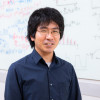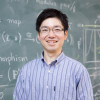151 events in 2022
-
Seminar

Spin transport in ultracold atomic gases
February 18 (Fri) at 14:00 - 15:00, 2022
Yuta Sekino (Postdoctoral Researcher, Astrophysical Big Bang Laboratory, RIKEN Cluster for Pioneering Research (CPR))
In condensed matter physics, transport measurement has played crucial roles in understanding fascinating phenomena such as superconductivity and quantum Hall and Kondo effects. In this talk, we discuss the usefulness of spin transport as a probe for many-body properties in ultracold atoms. In the first part, we focus on the conductivity of alternating spin current, which includes information on superfluid gap, pseudogap, and topological phase transition. In the latter part, we consider mesoscopic spin transport between two Fermi gases weakly connected with each other. Our analysis suggests that the spin current is sensitive to whether the gases have pseudogaps, which are gap-like structures in densities of states just above the superfluid transition temperature. In this talk, we also mention similarities of ultracold atoms to neutron star matter.
Venue: via Zoom
Event Official Language: English
-
Seminar

Hilbert transform and its applications to biology
February 17 (Thu) at 10:00 - 11:00, 2022
Shingo Gibo (Postdoctoral Researcher, RIKEN Interdisciplinary Theoretical and Mathematical Sciences Program (iTHEMS))
In chronobiology, the estimation of phase dynamics is important for measuring period and phase shift. However, it is difficult to precisely estimate the phase from time-series data when the frequency and the amplitude are nonstationary. Hilbert transform has been known as a signal processing method for decomposing time-series into the phase and the amplitude dynamics. This method allows us to analyze the phase from nonstationary time-series data. In this talk, I would like to introduce the basic concept of Hilbert transform and a few examples of its applications.
Venue: via Zoom
Event Official Language: English
-
Seminar

False vacuum decay in the Lorentzian path integral
February 15 (Tue) at 13:30 - 15:00, 2022
Takumi Hayashi (Ph.D. Student, Research Center for the Early Universe (RESCEU), The University of Tokyo)
False vacuum decay is a non-perturbative phenomenon in quantum field theory and important quantum process in cosmology. It has relied on the Euclidean formalism developed by Coleman, but there are several subtle issues in cosmological application as a negative mode problem or ambiguity in the definition of the decay rate in the presence of the gravity. Instead of the Euclidean path integral, we directly evaluate the Lorentzian path integral to discuss false vacuum decay and estimate the decay probability. To make the Lorentzian path integral convergent, the deformation of an integral contour is performed on the basis of the Picard-Lefschetz theory. We show that the nucleation probability of a critical bubble, for which the corresponding bounce action is extremized, has the same exponent as the Euclidean approach. We also extend our computation to the nucleation of a bubble larger or smaller than the critical one to which the Euclidean formalism is not applicable.
Venue: via Zoom
Event Official Language: English
-
Colloquium

The 18th MACS Colloquium
February 14 (Mon) at 15:00 - 17:30, 2022
Tetsuya Nagata (Professor, Division of Physics and Astronomy, Graduate School of Science, Kyoto University)
15:00- Talk by Prof. Tetsuya Nagata 16:05- 2021 MACS Result Briefing 16:30- Discussion
Venue: via Zoom
Event Official Language: Japanese
-
Workshop

Towards the Use of Data Assimilation for COVID-19 Investigations
February 14 (Mon) at 13:00 - 17:30, 2022
Catherine Beauchemin (Deputy Program Director, RIKEN Interdisciplinary Theoretical and Mathematical Sciences Program (iTHEMS))
Takemasa Miyoshi (Team Leader, Data Assimilation Research Team, RIKEN Center for Computational Science (R-CCS))This workshop aims to present recent investigations related to mathematical modeling of COVID-19 spread and impacts, and to foster the use of data assimilation techniques in future studies. It also aims to facilitate interactions and discussions among researchers from different fields such as epidemiology, economics, and mathematics. This workshop is jointly hosted by RIKEN Data Assimilation Research Team and by Nagoya University Graduate School of Mathematics, and supported by FY2021 RIKEN President's Discretionary Funds for COVID-19. A hybrid meeting is planned, but depending on the situation, an online version will be organized. Young researchers and students are encouraged to attend. Program: 13:00 - 13:10 Opening 13:10 - 14:00 Hiroshi Nishiura (Kyoto University) (35 min + 15 min Q&A) TBD 14:00 - 14:50 Catherine Beauchemin (RIKEN iTHEMS) (35 min + 15 min Q&A) The straight line: simple and effective 14:50 - 15:10 Break 15:10 - 16:00 Taisuke Nakata (The University of Tokyo) (35 min + 15 min Q&A) Balancing NPIs and Economic Activities 16:00 - 16:50 Qiwen Sun (RIKEN Data Assimilation Research Team, Nagoya University) (35 min + 15 min Q&A) Analysis of COVID-19 in Japan with Extended SEIR model and ensemble Kalman filter 16:50 - 17:30 Discussion
Venue: Hybrid Format (RIKEN R-CCS room 107 and Zoom)
Event Official Language: English
-
Seminar

Stochastic operators: properties and applications
February 10 (Thu) at 10:00 - 11:00, 2022
Gilberto Nakamura (Postdoctoral Researcher, RIKEN Interdisciplinary Theoretical and Mathematical Sciences Program (iTHEMS))
Stochastic processes are widely used to model systems in which one or more variables fluctuate randomly. Problems arise when large sets of random variables are allowed to interact with each other, as is often the case with physical and biological systems. Stochastic operators provide a convenient framework for describing the interactions and evolution of the random variables. In this talk, I will discuss techniques and methods typically used in spin systems to deal with stochastic operators and their spectral analysis in the context of random processes. I will briefly review their properties and applications to biological systems. As practical examples, I will present some results of my research in infectious diseases and migration of glioma cells.
Venue: via Zoom
Event Official Language: English
-
Seminar
Mixed dark matter scenarios consisting of primordial black hole dark matter and WIMPs
January 31 (Mon) at 11:00 - 12:00, 2022
Kenji Kadota (Senior faculty scientist, Hangzhou Institute for Advanced Study at University of Chinese Academy of Sciences (HIAS-UCAS), International Center for Theoretical Physics-Asia Pacific (ICTP-AP) Hangzhou Branch, China)
While the possibility for the primordial black holes (PBHs) to constitute all of the dark matter (DM) is being narrowed by the astrophysical observations such as the gravitational microlensing, the PBH as a partial DM component is still an intriguing possibility. I will discuss the scenarios where the rest of the dark matter consists of the widely discussed weakly interacting massive particles (WIMPs) and show that PBH and WIMP cannot co-exist with an emphasis on the astrophysical probes including the gamma ray, 21cm and CMB observations.
Venue: via Zoom
Event Official Language: English
-
External Event

RIKEN AIP-Suri-joshi Joint Seminar
January 29 (Sat) at 15:00 - 16:40, 2022
Ryosuke Iritani (Research Scientist, RIKEN Interdisciplinary Theoretical and Mathematical Sciences Program (iTHEMS))
Ade Irma Suriajaya (Assistant Professor, Faculty of Mathematics, Kyushu University)
Motoko Kato (Assistant Professor, Faculty of Science, Ehime University)"What are the personalities of AI and mathematical researchers? What kind of work do researchers do?" The RIKEN Center for Integrative Research on Innovative Intelligence (RIKEN AIP) and "Suri-joshi" are planning a joint event that will give high-school girls who are interested in mathematical scientists an opportunity to learn more about the fascinating work of AI and mathematical researchers.
Venue: via Zoom
Event Official Language: Japanese
-
Seminar
Recent progress on dualities in W-superalgebras
January 28 (Fri) at 16:00 - 18:00, 2022
Shigenori Nakatsuka (JSPS Fellow, Kavli Institute for the Physics and Mathematics of the Universe (Kavli IPMU), The University of Tokyo)
Vertex superalgebras are algebras which describe the chiral part of two dimensional superconformal field theory. A rich and fundamental class is provided by the affine vertex superalgebras associated with simple Lie superalgebras and the W-superalgebras obtained from them by cohomology parametrized by nilpotent orbits. Historically, the W-algebras associated with simple Lie algebras and principal nilpotent orbit have been studied intensively and are well-known to play an essential role in the quantum geometric Langlands program. In particular, they enjoy a duality, called the Feigin-Frenkel duality, which is a chiral analogue of the isomorphism between centers of the enveloping algebras of simple Lie algebras in Langlands duality. Recently, physicists found a suitable generalization for other types of nilpotent orbits from study on four dimensional supersymmetric gauge theory. In this talk, I will report the recent progress on our understanding of dualities in W-superalgebras since then in terms of several aspects: algebras, modules, and fusion rules.
Venue: via Zoom
Event Official Language: English
-
Seminar
Galactic archaeology with r-process elements
January 28 (Fri) at 10:00 - 11:30, 2022
Yutaka Hirai (JSPS Research Fellow, Department of Astronomy, Graduate School of Science, Tohoku University / JSPS Research Fellow (Visiting Scholar), Department of Physics, University of Notre Dame, USA)
Galactic archaeology studies the evolutionary histories of galaxies using information preserved in stars. Abundances of elements in stars are keys to understanding how the galaxies were evolved. It is, therefore, crucial to making it clear the origin of elements and the cycle of materials in galaxies. This talk will show the enrichment of heavy elements, including r-process elements, in dwarf galaxies and the Milky Way. Our high-resolution simulations of galaxies suggest that binary neutron star mergers play an important role in enriching r-process elements in dwarf galaxies and the Milky Way. I will also show that r-process enhanced stars in the Milky Way tend to form in dwarf galaxies previously accreted to the Milky Way. I will demonstrate that the abundance of r-process elements in stars can be used as an indicator for the early evolution of the Milky Way.
Venue: via Zoom
Event Official Language: English
-
Seminar
On Flow and Form at Low Reynolds Number
January 27 (Thu) at 10:00 - 11:00, 2022
Kenta Ishimoto (Associate Professor, Research Institute for Mathematical Sciences (RIMS), Kyoto University)
Cell locomotion is mechanically restricted by surrounding viscous fluids. With a focus on swimming cells in a low-Reynolds-number flow, I will give a brief introduction to microbiological fluid dynamics and present a 'hydrodynamic shape' theory at the cellular scale.
Venue: via Zoom
Event Official Language: English
-
Seminar
Bethe ansatz and quantum computing
January 26 (Wed) at 22:00 - 23:15, 2022
Rafael I. Nepomechie (Professor, Physics Department, University of Miami, Florida, USA)
We begin with a brief review of the Heisenberg quantum spin chain and its remarkable solution found by Bethe. We then review a probabilistic algorithm for preparing exact eigenstates of this model on a quantum computer. An exact formula for the success probability is presented, and the computation of correlation functions is discussed. A generalization of the algorithm to open chains with boundaries is also noted.
Venue: via Zoom
Event Official Language: English
-
Seminar
A simple XY model for cascade transfer
January 20 (Thu) at 13:30 - 15:00, 2022
Tomohiro Tanogami (Ph.D. Student / JSPS Research Fellow DC, Graduate School of Science, Kyoto University)
Cascade transfer is the phenomenon that an inviscid conserved quantity, such as energy or enstrophy, is transferred conservatively from large (small) to small (large) scales. As a consequence of this cascade transfer, the distribution of the transferred quantity obeys a universal scaling law independent of the details of large (small) scales. For example, in the energy cascade in fluid turbulence, the energy spectrum follows Kolmogorov's power law [1]. Such behavior is observed even in systems different from ordinary fluids, such as quantum fluid, elastic body, and spin systems. Here, we aim to establish the concept of a universality class for cascade transfer. As a first step toward this end, we propose a simple model representing one universality class [2]. In doing so, we regard cascade transfer as a cooperative phenomenon of unidirectional transport across scales and ask how it emerges from spatially local interactions. The constructed model is a modified XY model with amplitude fluctuations, in which the spin is regarded as the “velocity” of a turbulent field in d dimensions. We show that the model exhibits an inverse energy cascade with the non-Kolmogorov energy spectrum. We also discuss the relation to spin turbulence [3,4] and atmospheric turbulence [5].
Venue: via Zoom
Event Official Language: English
-
Seminar

A study of biological systems from topological point of view
January 20 (Thu) at 10:00 - 11:00, 2022
Hiroyasu Miyazaki (Senior Research Scientist, RIKEN Interdisciplinary Theoretical and Mathematical Sciences Program (iTHEMS))
A biological body can be regarded as a complicated network of chemical reactions. The chemical reaction network (CRN) is a (hyper)graph-theoretic model of such biological networks. Recently, in the joint work with Yuji Hirono, Takashi Okada and Yoshimasa Hidaka, we applied a topological method to the study of CRNs, and found a suitable way to simplify the networks. Since Professor Hirono has already explained our work in this seminar, I will try to explain it from a slightly different point of view. In the first half of the talk, I will review the entire work. In the second half, I will try to give a rough sketch of the mathematical method we used in the work.
Venue: via Zoom
Event Official Language: English
-
Seminar
Axion-like particles from core-collapse supernovae
January 17 (Mon) at 11:00 - 12:00, 2022
Kanji Mori (Research Institute of Stellar Explosive Phenomena (REISEP), Fukuoka University)
Axion-like particles (ALPs) are a class of hypothetical pseudoscalar particles which feebly interact with ordinary matter. The hot plasma of stars and core-collapse supernovae is a possible laboratory to explore physics beyond the standard model including ALPs. Once produced in a supernova, some of the ALPs can be absorbed by the supernova matter and affect energy transfer. We recently calculated the ALP emission in core-collapse supernovae and the backreaction on supernova dynamics consistently. It is found that the stalled bounce shock can be revived if the coupling between ALPs and photons is as high as g_{a gamma} ~ 10^{-9} GeV^{-1} and the ALP mass is 40-400 MeV. In this talk, I will briefly review stellar and supernova constraints on ALPs and then discuss our recent results.
Venue: via Zoom
Event Official Language: English
-
Seminar
The Ohsawa-Takegoshi L2 extension theorem and variations of Bergman kernels
January 14 (Fri) at 16:00 - 18:00, 2022
Genki Hosono (Mathematical Institute, Graduate School of Science, Tohoku University)
In complex analysis and geometry, L2 methods are very important and widely used. Recent studies show that the L2 theory and the variational theory are closely related. In particular, the (optimal) L2 extension theorem can be proved by subharmonicity of variations of Bergman kernels and vice versa. In this talk, I will explain the background, results, and key ideas of the proof. *Please contact Keita Mikami mailing address to get access to the Zoom meeting room.
Venue: via Zoom
Event Official Language: English
-
Seminar
A comprehensive view of the SARS-CoV-2 infection process
January 13 (Thu) at 10:00 - 11:00, 2022
Wataru Nishima (Scientist, New Mexico Consortium, Mexico)
Nishima et al. recently published a paper about a computational model of SARS-CoV-2 Spike Protein [1]. Although it is still a hypothesis due to the lack of direct experimental evidence, the story comprehensively explains the initial infection process of SARS-CoV-2 consistent with most of the empirical evidence. In the presentation, I would like to explain the overview of the infection process for the non-expert audience and how the hypothesis influences the current COVID-19 situation. If time permits, I would like to briefly explain the current plan of the iTHEMS-NMC COVID project, which is going to be the first case of undergoing an interdisciplinary collaboration framework between Japan and the US.
Venue: via Zoom
Event Official Language: English
-
Seminar
Physics of nuclear bodies
January 6 (Thu) at 10:00 - 11:00, 2022
Tetsuya Yamamoto (Specially Appointed Associate Professor, Institute for Chemical Reaction Design and Discovery, Hokkaido University)
Eukaryotic nucleus is not a uniform solution of DNA, but there are a number of nuclear bodies in the interchromatin spaces. There are growing number of experiments that suggest that nuclear bodies are assembled by liquid-liquid phase separation (LLPS). Condensates assembled by LLPS show coarsening or coalescence to decrease the surface energy. However, in some nuclear bodies, such as paraspeckles, nuclear stress bodies, and fibrillar centers in nucleoli, multiple condensates are stably dispersed and are not likely assembled by LLPS. The assembly mechanism of nuclear bodies is relevant to the regulation of the area of condensate surfaces, which are functional in some nuclear bodies, and the mobility of nuclear bodies. Hirose group (Osaka Univ.) has elucidated that nuclear bodies are scaffolded by a class of RNA, called architectural RNA (arcRNA), which forms complexes with RNA binding proteins. This implies that the assembly of nuclear bodies is governed RNA dynamics, such as transcription, degradation, and processing, and the sequence of bases of arcRNA. In the seminar, I will show how the base sequences and the dynamics of RNA are involved in the assembly of paraspeckles and fibrillar centers in nucleoli.
Venue: via Zoom
Event Official Language: English
151 events in 2022
Events
Categories
series
- iTHEMS Colloquium
- MACS Colloquium
- iTHEMS Seminar
- iTHEMS Math Seminar
- DMWG Seminar
- iTHEMS Biology Seminar
- iTHEMS Theoretical Physics Seminar
- Information Theory SG Seminar
- Quantum Matter Seminar
- ABBL-iTHEMS Joint Astro Seminar
- Math-Phys Seminar
- Quantum Gravity Gatherings
- RIKEN Quantum Seminar
- Quantum Computation SG Seminar
- Asymptotics in Astrophysics SG Seminar
- GW-EOS WG Seminar
- DEEP-IN Seminar
- NEW WG Seminar
- Lab-Theory Standing Talks
- QFT-core Seminar
- STAMP Seminar
- QuCoIn Seminar
- Number Theory Seminar
- Academic-Industrial Innovation Lecture
- Berkeley-iTHEMS Seminar
- iTHEMS-RNC Meson Science Lab. Joint Seminar
- RIKEN Quantum Lecture
- Theory of Operator Algebras
- iTHEMS Intensive Course-Evolution of Cooperation
- Introduction to Public-Key Cryptography
- Knot Theory
- iTHES Theoretical Science Colloquium
- SUURI-COOL Seminar
- iTHES Seminar
